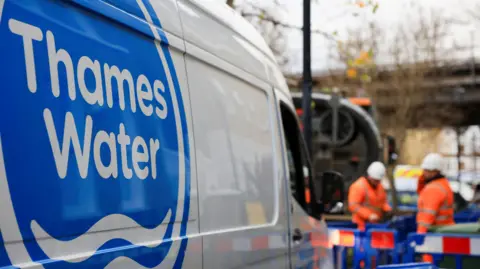The highly publicized situation surrounding Thames Water—a utility company that provides essential services to a significant portion of the UK’s population—has reached a critical juncture. As the debate intensifies around the financial stability and operational integrity of this vital service provider, the government has taken proactive measures to prepare for potential nationalization. Environment Secretary Steve Reed has indicated that preparations for the temporary nationalization of Thames Water have been accelerated, underscoring the urgency of addressing the company’s mounting challenges.
During a parliamentary session, Reed cautioned that the government is fully prepared for all possible scenarios, which may include taking control of the ailing company, should circumstances necessitate such action. The urgency of this strategy was magnified when the US private equity firm KKR withdrew from a proposed £4 billion rescue deal just a few weeks prior. This withdrawal was seen as a significant blow to Thames Water’s efforts to secure a financially solvent future and has heightened concerns over the utility’s ability to sustain its operations.
In light of these challenges, Thames Water executives, such as Leonie Dubois, have reaffirmed the organization’s commitment to stabilizing its financial standing. Dubois articulated that the company is tirelessly working towards creating a more robust economic foundation. However, with substantial debts and ongoing problems related to leaks, sewage spills, and the modernization of aging infrastructure, the hurdles ahead are considerable.
Reed addressed inquiries from Labour MP Catherine Fookes, stating that despite the precarious situation, Thames Water is still financially stable. He emphasized the government’s dedicated stance on acting in the country’s best interests concerning the water utility. This assurance is crucial, particularly when public trust in Thames Water is waning, as the utility serves roughly 25% of the UK’s population mainly across southern England and London.
A major factor in Thames Water’s ongoing struggles has been its reliance on regulatory leniency from Ofwat, the water industry regulator. In previous months, criticisms were leveled at the company for its environmental failings, where internal assessments suggested that the firm needed regulatory support to avoid severe fines that could further strain its financial position. The idea that KKR stepped back from its investment was partially attributed to the perceived political and regulatory risks associated with Thames Water, raising questions on how viable oversight can be in this context.
Reed’s assertions that Thames Water has statutory obligations to fulfill reveal the heavy regulatory environment surrounding the industry. It is clear that any potential government oversight, or administration may require establishing accountability measures to ensure that the utility operates within established environmental and service standards.
Moreover, Thames Water is informing its customers that operations will proceed as usual, despite the ongoing evaluations regarding its ownership and management. Dubois reiterated this sentiment, stating, “We are focused on our core functions of delivering water and managing sewage services.” The company is aiming for a sweeping recapitalization strategy, which has led to a proposal from the Thames Water Creditor Group for a £17 billion recapitalization plan aimed at sourcing new capital to rejuvenate its aging infrastructure.
Furthermore, this creditor consortium is advocating for broad regulatory backing to galvanize investments that are crucial to revamping the services and ensuring better outcomes for consumers. This highlights the interplay between regulatory environment, financial challenges, and the company’s commitment to improved service quality.
In summary, the situation at Thames Water serves as a critical case study in the challenges faced by utility companies that are at the intersection of public service, financial instability, and regulatory oversight. As stakeholders—ranging from government officials, to investors, to consumers—navigate the evolving landscape, the realms of accountability and service delivery will remain essential focal points in the discussion of Thames Water’s future.



